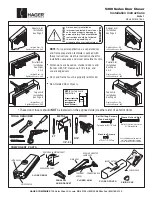
BACKCHECK VALVE
CLOSER BODY
PARALLEL
ARM BRACKET
POWER ADJUSTMENT SHAFT
REGULAR ARM/TOP
JAMB SHOE
CONNECTING ROD
INSERT CUTOUT
FOREARM
SCREW
SCREW PACK
MAIN ARM
CLOSER ARM
PINION CAP
CLOSER COVER
LATCH VALVE
SWEEP VALVE
HAGER COMPANIES
139 Victor Street, St. Louis, MO 63104 • (800) 325-9995 • Fax (800) 782-0149
TOOLS REQUIRED
COMPONENT PARTS
METAL
1/4"- 20
#7
3/16"
WOOD
Self Drilling Screws
Wood and Metal
For wood, drill 3/16" hole
Sleeve Nut and Bolt
Drill 9/32" thru from Closer Side
3/8" Drill other Side
Machine Screws
#7 Drill, 1/4"- 20 Tap
An incorrectly installed or
improperly adjusted door closer
can cause property damage or
personal injury. These installation
instructions should be followed
to avoid the possibility of
misapplication or misadjustment.
NOTE:
For special applications, a separate door
and frame preparation template is packed with
these instructions. Use this instruction sheet for
installation sequence and closer adjustments only.
Dimensions are based on standard doors and
frames with 1/8" clearance, 5/8" stops, and
square edge doors.
Door and frame must be properly reinforced.
Non-Handed Door Closers.
• These door closers should
NOT
be installed on the exposed side (weather side) of exterior doors.
Regular Arm
Installation
See Page 2
Left Hand Door - LH
Right Hand Reverse - RHR
Regular Arm
Installation
See Page 2
Right Hand Door - RH
Left Hand Reverse - LHR
Top Jamb
Installation
See Page 5
Top Jamb
Installation
See Page 5
NOTE:
For Top Jamb
Application
Left Hand Door - LH
Right Hand Reverse - RHR
Right Hand Door - RH
Left Hand Reverse - LHR
Parallel Arm
Installation
See Pages
3 & 4
Parallel Arm
Installation
See Pages
3 & 4
Left Hand Door - LH
Right Hand Reverse - RHR
Right Hand Door - RH
Left Hand Reverse - LHR
•
•
•
A longer connecting
rod is required for
reveals greater
than 4" (102mm)
Reveal
5300 Series Door Closer
Installation Instructions
Grade 1
Meets ANSI A156.4
Check building and fire codes to
see if your application requires
the use of sleeve nuts and bolts.






